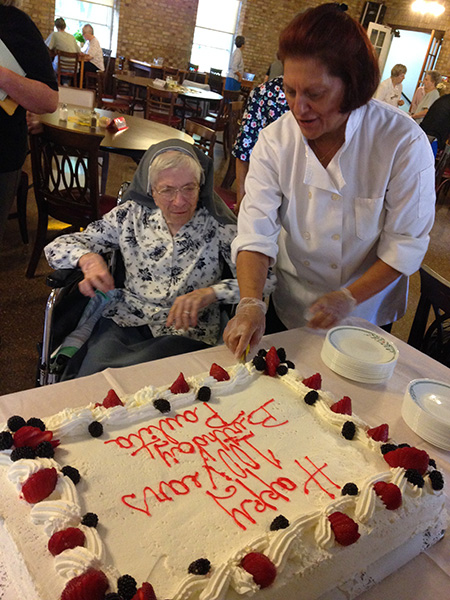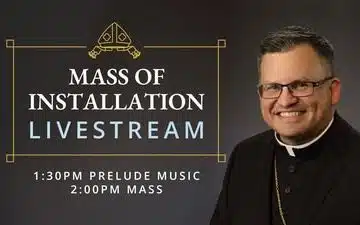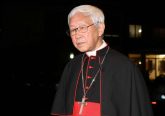At 100, Maryknoll sister ‘still has work to do’

By Eileen Connelly, OSU
The Catholic Telegraph
Most young girls growing up in Cincinnati in the 1920s didn’t dream of become missionaries to China, yet from an early age, Maryknoll Sister Paulita Hoffman knew exactly what she wanted to do, and what God’s will for her was. The spunky nun, who celebrated her 100th birthday in August, is now looking back on life of faith and dedicated service. As she recently said, “God tells me I still have work do.”
Sister Paulita, who attended Sacred Heart (Fairfield) and St. Monica schools, and graduated from Our Lady of Angels High School, considered following her older sister into teaching and tried it for a time, but explained that, “I didn’t want to spend the rest of my life teaching. I had a great interest in China. I thought, ‘There are millions of people in other countries that have never had anyone give them the knowledge of Jesus Christ and I thought somebody should go.’”
The question for the determined young lady was how to get there. The answer came one afternoon while visiting St. Monica Parish with her mother. As it turns out the priest who was hearing confessions that day was a Maryknoll father who was filling in at the parish. The teenager shared her dream with him saying, “I want to go to China and be a missionary, but there’s no place to do that.”
The priest’s response? “Oh, yes, there is!” He gave her the address of Mother Mary Joseph Rogers, foundress of the Maryknoll Sisters, the first U.S.-based congregation of women religious dedicated to foreign mission. At the time, the order had a strong missionary presence in China.
Sister Paulita excitedly wrote to Mother Mary Joseph, and with her mother’s support, entered Maryknoll in 1933. After making her first vows at Maryknoll’s New York motherhouse in 1936, she served as assistant novice mistress. In 1938, she received her first overseas assignment, doing pastoral work in Kaying, China, while she studied the native language.
“I was thrilled,” she recalled. “I hit the sky. Not every sister got to go.”
The situation in China was “very difficult” at the time of her arrival, Sister Paulita said. It was the height of the Japanese invasion and most major Chinese cities were under Japanese control. “They (the Japanese) were out on the streets all the time,” she said, “so we had to do our ministry when they went in to eat their meals. We would go out and teach the people, visit the sick and bring communion.”
“Most of the time, the men were in the Army and the women were working in the fields, so we would do our lessons in the fields,” she added. “We would sit there and I would say their 10 basic prayers (the Our Father, Hail Mary and Gloria, among others) in their language and they would repeat them back to me. Once they knew their prayers, the priest would baptize them.”
As much as the people she ministered to learned from her, Sister Paulita also garnered many lessons from them and built many meaningful relationships.
“They were very understanding, loving and accepting people,” she said. “We liked them, we appreciated them, we respected them, and they loved us for it.
Her greatest reward was in seeing them “getting to know a personal God they could appeal, a God who understand their heart, and to whom they could pray.”
While Sister Paulita’s ministry brought her great joy, after 12 years in pastoral, catechetical and vocations work, her time in China was not without hardship. In 1950, the Communist regime placed Sister Paulita and a fellow missionary under house arrest. For 14 months, the women endured fear, malnourishment and abuse. Their possessions were repeatedly searched, and the sisters were marched through streets, targets for mud, stones and shouted accusations. Sister Paulita and her companion maintained their faith and dignity through it all, and in 1951, after the death of the imprisoned American bishop, they were released into Hong Kong.
After two years at the Maryknoll Center recovering her health and editing her memoirs, titled Red China Days, Sister Paulita returned to missionary work renewed in body and spirit. She would spend the better part of the next 50 years living and working in Taiwan serving in catechetical and pastoral ministry, social work and the formation of Christian communities. The people of Taiwan were so grateful for her service and friendship that she was granted permanent residency status by the Taiwanese government in 2003.
In 2012, Sister Paulita was assigned to the Maryknoll Sisters Center in Maryknoll New York, where she continues to volunteer in the Development Department. On Aug. 13, she gathered with family and friends to celebrate her milestone birthday. She remains committed to doing God’s work in whatever form that may be.
“So long as I’m able to continue to do things to help the community, I’m happy to do that,” she said.
This story originally appeared in the October 2014 print edition of The Catholic Telegraph.













